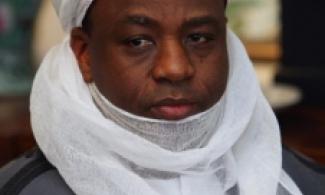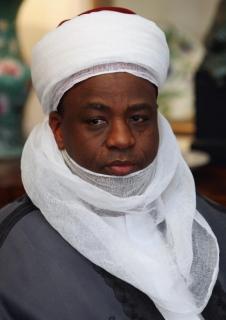
The Sultan of Sokoto, Sa’ad Abubakar, has appealed to Nigerians to desist from tagging members of ethnic groups different from their own as criminals.
The Sultan of Sokoto, Sa’ad Abubakar, has appealed to Nigerians to desist from tagging members of ethnic groups different from their own as criminals.
The traditional ruler, who is also the President-General of the Nigerian Supreme Council for Islamic Affairs, made the appeal on Wednesday in Abuja at the launch of a book in honor of the Registrar of the Joint Admission and Matriculation Board (JAMB), Is-haq Oloyede.
The book, titled “Dynamics of Revealed Knowledge and Human Sciences”, was co-authored by several scholars in and outside Nigeria and focuses on religion and other topics.
Mr. Abubakar’s remarks were in reference to the currently raging deadly conflicts of farmers and herders in Nigeria for which Fulani herdsmen are routinely portrayed as the aggressors in the Nigerian media.
According to the Sultan, whose stool was founded by Fulani Islamic jihadists in the 18th Century, there are lots of Fulani in Nigeria who are not herdsmen. To therefore stereotype a particular ethnic group as criminal is totally wrong, he said.
“Herdsmen crisis is simply economic survival which needs to be tackled and resolved. We need to take the negative thoughts away from us; our moral level in this country has gone so low,” he said.
“It is so sad that tens of thousands of people are dying every day while our governors, politicians are well-guarded by security men."
“We do not have statesmen, we have men of the state. We have governors who only see their immediate environment as their own. It is no longer a state for all. We need to sit together and proffer solution on how to move this nation forward,” he admonished.
The Sultan praised the authors for writing the book in honor of Mr. Oloyede while he is still alive, lamenting that honest and upright people are not usually celebrated in Nigeria until they are gone, when schools, hospitals, and airports may then be named after them.
“A dead person is gone and it is important to be celebrated while alive. Oloyede is an honest and an incorruptible person,” he said.
Also speaking at the event, a former Chief Justice of Nigeria, Salihu Belgore, said the book will provide insight for scholars to understand the Islamic holy book, the Qur’an.
“This book will assist every individual to understand and comprehend the Holy Qur’an, so it is recommended for all to read it,” he said.
The book reviewer, Afiz Oladosu, a professor at the University of Ibadan, said the book, which has 26 chapters and 599 pages, was written in English and Arabic.
He recommended it to individuals who desire and value knowledge.
“The book has three main groups of essays which talk about Islamic economy, Christian study, Arabic culture, and civilization. The book discussed the contributions of Islamic studies to scholars in Nigeria,” Mr. Oladosu said.
“Currently, there is an issue of the practice of Islamic law in Nigeria, this book really discussed it at length. Therefore, everyone should lay their hands on the book and read it,” he said.
According to the professor, the book does not have structure, although it is thoughtful and provoking and therefore should be recommended for scholars in humanities, law, and social sciences.
“Perfection is an ideal we constantly pursue. Lack of structure itself is a style in a world which is structure-less. Plato said there is a method for everything in the world if you are going to run mad, do it with a method,” Mr. Oladosu said.
The book presenter, who is also the pro-chancellor and chairman of the governing council of the University of Lagos, Wale Babalakin, donated N5 million to support the book.
“In support of knowledge, I will honor the book. The desire to win is born in most people but the will to win is a matter of training,” he said while announcing the donation.
In his remarks, Mr. Oloyede said Nigeria can only be a great country when its people shun partisan sentiments.
“When an individual is found to be unable to account for whatever belongs to the government, our first duty is to tell the person to refund and when the person refunds honorably, there is no need to go further."
“But if the person refuses, we hand them over to law enforcement agencies to recover government properties,” he said.
